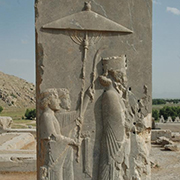Nowadays we know “Il Xerse” mainly thanks to George Frideric Handel’s opera which he composed in 1738. But in truth, Handel’s opera is nothing other than the final chapter in the history of a subject which had been set to music by Francesco Cavalli almost a century earlier: “Il Xerse”, performed for the first time in 1655 in the Teatro SS. Giovanni e Paolo in Venice, was one of the most successful operas of its day. This is reflected not only by many well-known revivals throughout Italy, but also by the fact that the opera was chosen to be performed in Paris at the festivities for the wedding of the French King Louis XIV to Princess Maria Theresa of Spain.
The opera’s success essentially rests on the subject which the librettist Nicolò Minato took from the seventh book of Histories by Herodotus, a work dating from the 5th century BC. This narrates how the Persian King Xerxes prepared to invade Europe with his army. But the Histories, which Minato knew from a 15th century translation by Matteo Maria Boiardo, form only the framework of the drama, which is otherwise based on the plot of an infectious comedy of 1651 by the Neapolitan dramatist Raffaele Tauro entitled “L’ingelosite speranze”. Tauro’s comedy in turn is an Italian version of Lo cierto por lo dudoso, a Spanish comedy by Lope de Vega of 1625, the golden age of Spanish drama.
Thus, comedy with risqué situations and finally a sudden change in the plot are amongst the strengths of this drama. The comic element essentially comprises the efforts of the temperamental Xerxes to win the beautiful maid Romilda for himself, but she is truly in love with Arsamene, the King’s brother. The intrigues which inevitably follow trigger a wide range of emotions in those involved, depicted in stylistically extremely varied music. Each character, whether serious or comic, never conforms to a mere stereotype, but always reacts individually with a psychological complexity to the events which are entirely human and also easily understood by modern audiences.
“Xerxes” is an extremely theatrical character even without this. This Persian king was already regarded as synonymous with arrogance in literary texts of the early modern period. He is a king who is obsessed by a tremendous lust and grossness which, according to Herodotus, leads the Gods to punish him because he strives to cross the boundary between human and godly acts. This grossness in the hero of the title also forms the thread running through Minato’s drama in which all characters strive not to fall prey to the vacillating ruler’s anger. But it is precisely this grossness which also brings about the collapse of Xerxes’ plans, for the King finally falls into a trap set by himself, and thus has to watch how Romilda, whom he loves, is to marry Arsamene of all people, his sworn enemy. The deep disappointment which follows this event fulfils a necessary cathartic (if you like, pedagogical) function, and finally forces the King to accept a situation of which he is no longer master. This psychological volte-face can easily be followed by modern audiences.
The main plot, intensified by an attractive sub-plot, is crowned by spectacular events which Minato took from his sources and is then enriched with the help of his dramaturgical genius. Thus, examples of amorous rivalry, alleged betrayal, slander, disguises, thwarted murder, appearances by magicians, destructive storms, war scenes and moments of pure comedy pile up. But in order to recognize the uniqueness of this opera, the experience of its first scene suffices. In this we tarry on the shores of the Hellespont with Xerxes and admire the majestic plane trees which he then has hung with gold, and to which he sings one of the most beautiful and famous love songs of the 17th century – a song which also touched Handel’s heart: “Ombra mai fu …”
Sara Elisa Stangalino / Hendrik Schulze
(from [t]akte 1/2019 – translation: Elizabeth Robinson)



